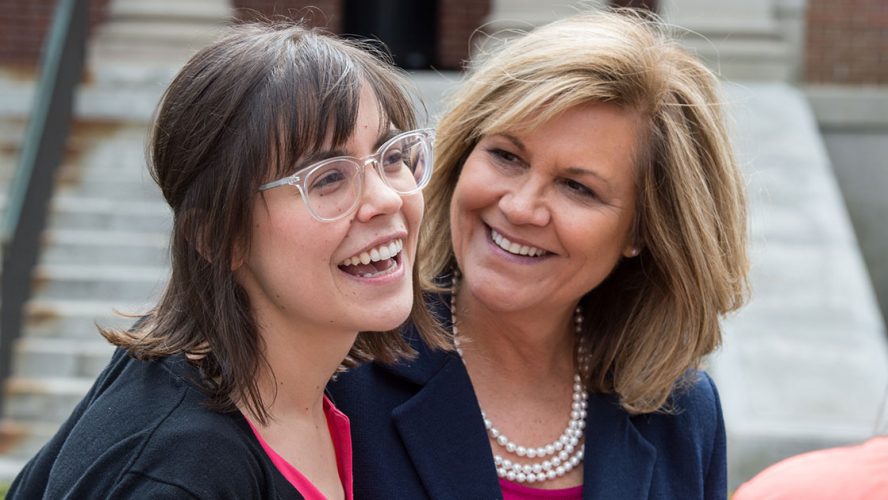Rebecca Rhoads remembers loving math and science when she was just five or six years old.
Rhoads took that passion and turned it into a career. She’s now the president of global business services at Raytheon, a technology and innovation leader specializing in defense, civil government, and cybersecurity solutions.
But Rhoads faced challenges during her 42-year career, including often being the only woman in the room.
She realized early on that she would have to work harder than her male peers. During a college engineering class, one of her professors had trouble solving a math problem. Rhoads jumped up, grabbed the chalk and fixed the problem. The professor wasn’t embarrassed and went on to mentor her, including helping Rhoads get her first engineering job.
One of the big lessons he taught her was to know her worth. She was eager to get an engineering job, even if it didn’t pay. But he told her, “’Never say that. Your pay is the currency that the company uses when they communicate your value.’”
Right then, she became an equal pay advocate for herself and others.
Persistence and resiliency
Rhoads, who has both bachelor’s and master’s degrees in electrical engineering from California Polytechnic University, as well as a master’s degree in executive management from UCLA, started her career as an electrical engineer. Over the years she’s worked at General Dynamics, Hughes, and Raytheon.
However, when Rhoads started out in the aerospace defense industry, every woman in the office was a secretary, except her.
It was a boys’ club atmosphere, where many men hung up Playboy pinups in the lunchroom.
“I found that you just have to have persistence, humor, and resiliency,” she says, explaining initially, male colleagues didn’t welcome the idea of working with women.
Over time, they got used to Rhoads, trusted her, and knew she’d deliver her projects on-time and on budget.
“Maybe it was a little easier for the next female project manager coming in behind me,” she says. “But my guess is that over time, they’ve all had to build those relationships, build the rapport, and build their professional brand, kind of one project at a time, one person at a time.”
Rhoads often moved laterally during her career, which was difficult at the time. But she realized she needed sponsors to help her have access to different opportunities.
She won over male colleagues by taking on challenging projects and earning the reputation as a turnaround leader.
“My career was paved with running toward the fire or toward the problem and challenge,” she says. “I found that when I ran toward really messy situations, people weren’t trying to elbow me or sideline me, because most people were running the other way.”
Diversity and mentorship
Rhoads says there’s more work to be done to close the industry’s STEM diversity gap. That includes helping kids harness their STEM skills and envision and work toward careers in math and science.
Next, she says companies need to have a diverse slate of candidates in the pipeline, which means preparing diverse employees with different tasks throughout their career so that they’ll be ready to take on new roles when the opportunity arises.
She also encourages companies to hire employees via blind selection. That means they don’t look at the candidate’s sex, race, or names. Merit is the qualifier.
A mentor for up-and-coming engineers, Rhoads has always been an advocate for young women in engineering. Throughout her career, she’s championed diversity and inclusion, including helping establish Raytheon’s Women Network, the company’s first employee resource group.
She’s also a mentor to many men and women — including her children, 36-year-old Dustin and 33-year-old Julianne, who’s also an engineer.
“It’s very rewarding,” she says. “You give people tools and confidence and then watch them take off.”


